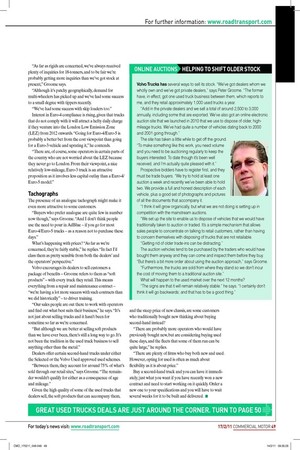Top of the game
Page 41

Page 42

If you've noticed an error in this article please click here to report it so we can fix it.
CM pops in to see Peter Groome, director of used trucks for Volvo Trucks, to find out whether it has suffered vehicle shortages and how prices have been affected
Words: Steve Banner While franchised and non-franchised dealers nationwide might be complaining about the lack of second-hand vehicles, it is not a crisis that is enveloping Volvo, says its director, used trucks, Peter Groome.
“In truth, we’re not especially suffering from a shortage of trucks for our retail businesses,” he says. “Although there is probably a shortage of stock suitable for export; to be honest, we’re not in a bad position at all.
“We’ve managed our stock very carefully over the past couple of years, so as a consequence we’re about where we want to be.” The ex-contract trucks that come back to Volvo are, typically, around four years old. “Lately though we’ve been seeing some newer ones, and we’ve got quite a few that are around three years old,” says Groome.
“We’ve gone out and bought some trucks in the marketplace too,” he adds. “We’re always looking.” Groome and his colleagues intend to purchase more retailable second-hand Volvos over the next two to three years as late-registered used trucks get thinner on the ground – a problem that is going to affect other vendors of second-hand vehicles. New registrations have been at historically low levels over the past couple of years for all manufacturers, and trucks clearly cannot be sold secondhand if they are not sold new in the irst place.
Fleet specification units
Tractor units dominate Volvo’s used stock, and a high percentage of them are leet speciication.
“For the most part, we’re talking about FH 6x2s with XL cabs and at 440hp or 460hp,” he says. “About 95% will have the automated I-Shift gearbox – we very rarely take an inquiry for a manual box these days.
“We get FM 6x2s and 4x2s built to a similar speciication coming back as well,” he continues. “There’s strong UK demand for the newer FMs, with the older ones typically going overseas; and export demand is healthy. “As far as rigids are concerned, we’ve always received plenty of inquiries for 18-tonners, and to be fair we’re probably getting more inquiries than we’ve got stock at present,” Groome says.
“Although it’s patchy geographically, demand for multi-wheelers has picked up and we’ve had some success to a small degree with tippers recently.
“We’ve had some success with skip loaders too.” Interest in Euro-4 compliance is rising, given that trucks that do not comply with it will attract a hefty daily charge if they venture into the London Low Emission Zone (LEZ) from 2012 onwards. “Going for Euro-4/Euro-5 is probably a better bet from the cost viewpoint than going for a Euro-3 vehicle and uprating it,” he contends.
“There are, of course, some operators in certain parts of the country who are not worried about the LEZ because they never go to London. From their viewpoint, a nice relatively low-mileage, Euro-3 truck is an attractive proposition as it involves less capital outlay than a Euro-4/ Euro-5 model.”
Tachographs
The presence of an analogue tachograph might make it even more attractive to some customers.
“Buyers who prefer analogue are quite few in number now though,” says Groome. “And I don’t think people use the need to pour in AdBlue – if you go for most Euro-4/Euro-5 trucks – as a reason not to purchase these days.” What’s happening with prices? “As far as we’re concerned, they’re fairly stable,” he replies. “In fact I’d class them as pretty sensible from both the dealers’ and the operators’ perspective.” Volvo encourages its dealers to sell customers a package of beneits – Groome refers to them as “soft products” – with every truck they retail. This means everything from a repair and maintenance contract – “we’re having a lot more success with such contracts than we did historically” – to driver training.
“Our sales people are out there to work with operators and ind out what best suits their business,” he says. “It’s not just about selling trucks and it hasn’t been for sometime so far as we’re concerned.
“But although we are better at selling soft products than we have ever been, there’s still a long way to go. It’s not been the tradition in the used truck business to sell anything other than the metal.” Dealers offer certain second-hand trucks under either the Selected or the Volvo Used approved used schemes.
“Between them, they account for around 75% of what’s sold through our retail sites,” says Groome. “The remainder wouldn’t qualify for either as a consequence of age and mileage.” Given the high quality of some of the used trucks that dealers sell, the soft products that can accompany them, and the steep price of new chassis, are some customers who traditionally bought new thinking about buying second-hand instead?
“There are probably more operators who would have previously bought new, but are considering buying used these days, and the leets that some of them run can be quite large,” he replies.
“There are plenty of irms who buy both new and used. However, opting for used is often as much about lexibility as it is about price.”
Buy a second-hand truck and you can have it immediately; just what you want if you have recently won a new contract and need to start working on it quickly. Order a new one to your speciications and you will have to wait several weeks for it to be built and delivered. ■












































